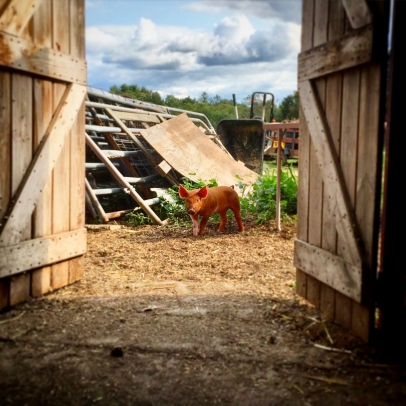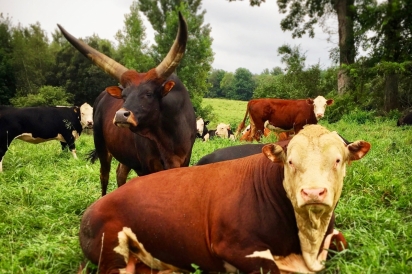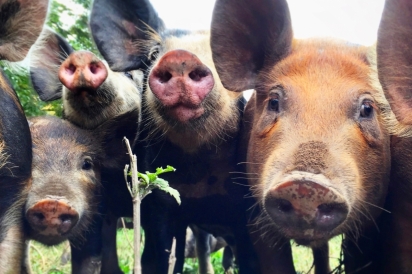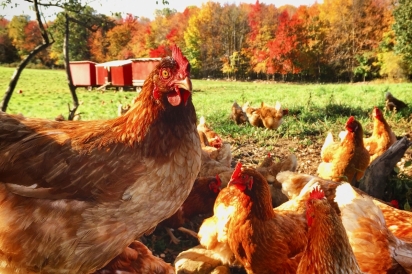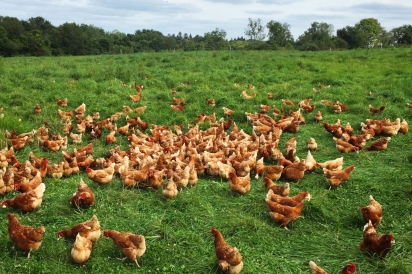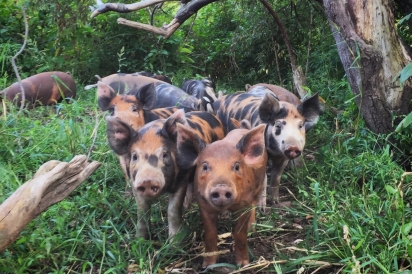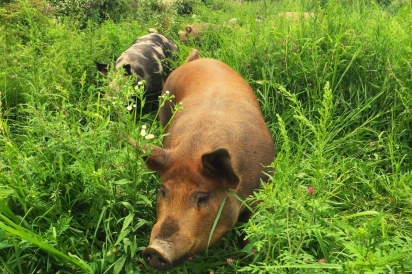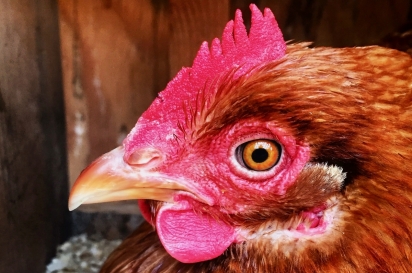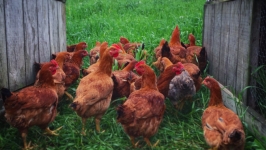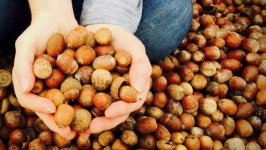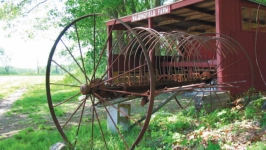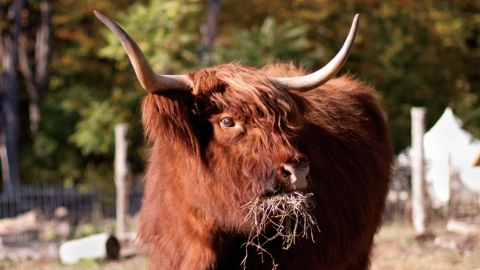The Role and Responsibility of Local Livestock Farming
As a nation and as a planet, our consumption of animal protein has increased markedly over the past century. We have developed a great hunger for cheap meat, dairy, and eggs, and the wages of that hunger are environmental degradation, labor exploitation, and cruelty on a scale that is difficult to comprehend. Simply put, as a culture, we eat too much meat, and what we do eat is largely of the wrong kind.
Yet, a vegetarian or vegan lifestyle is not necessarily the solution to this problem, if our interest is eating in a sustainable manner. To maintain a vegan diet in the depths of a New England winter often entails transporting foods from across the nation with a disregard for food miles and seasonality. It also ignores a vital link between animal and plant, frequently ignored by industrial agriculture, that is at the center of the natural world, a cycle of grazing, manuring, birth, and decay that fertilizes and builds soils. Animal agriculture, well managed and scaled properly, can emulate that cycle and be beneficial to the landscape rather than destructive.
Here in Connecticut – and across the nation as a whole – choosing local and ethical options when consuming animal protein can have a positive impact that spreads from farm to community and beyond. Small farms raising livestock in modest numbers were once the agricultural standard, and, thankfully, such farms are once again appearing throughout our region. Some milk Holstein dairy cows, others raise heritage hogs, goats, or even rabbits, but the unifying feature of these sustainable farms is that they are raising animals with care and attention, in conjunction with the seasons and the environment.
The men and women running these farms are hard at work repairing the intrinsic link between land and livestock that has, in many cases, been all but severed in an industrial setting. They are moving cattle from the feedlot to the finishing pasture, moving laying hens from cages to fields, and bringing hogs out of gestation crates and swine barns and into the meadows and forests of New England. They raise healthy animals without growth hormones and with little or no antibiotics. They build soils with pasture rotation and combat global warming with carbon sequestration and low product mileage. They protect waterways and wetlands with careful stewardship. They care for the quality of life of their animals, because they see them as more than numbered commodities. A small farmer does not raise livestock out of callousness or greed, but rather out of a love and affinity for the breeds under his care.
The small dairy farmer knows his cows, not simply in terms of gallons given, but in terms of temperament and personality. The ethical hog farmer delights in the dirt-nosed rooting of his piglets, is saddened when they eventually go on to slaughter, and realizes that both emotions are essential to good husbandry. Small livestock farmers recognize and appreciate the concept of sacrifice. Livestock farming is a year-round enterprise, with work on the iciest of February mornings as important as that on the most sweltering of July afternoons. The farmer bends his back in labor, and his stock gives its energy and life to keep the farm going. The farm, in turn, fosters new generations of livestock and sustains the farmer and his community. Together, farmer and stock are twin parts of an agricultural heritage 10,000 years in the making.
As consumers, when we choose to purchase local, sustainable proteins, we too are entering into that tradition. Our dollars stay in our communities, flowing first to the farmers, and then on to local butcher shops, creameries, slaughterhouses, feed stores, and a host of other related business. By buying local meat and milk, we are choosing to support a challenging and time-consuming way of farming instead of the faceless and commoditized industrial model. Ultimately, we are choosing the ethics of well-raised livestock over the quick savings of a world that prioritizes profit over compassion. We are choosing to eat well and thoughtfully and always in tandem with the seasons: spring lamb; pasture-raised eggs with bright, golden yolks in summer; heritage breed turkeys for Thanksgiving; and winter stews made hearty with root vegetables and smoked pork.
Being a consumer of local protein means understanding or at least appreciating the bond between a farmer and his livestock. It means understanding the nature of life and death, and acknowledging the gratitude, joy, worry, and frustration of trying to do the right thing in a system that rewards shortcuts. It means understanding that suffering and death are not synonymous, and that a life well lived, with sun and space and comfort, can also end well, particularly when that end sustains others.
When the thoughtful consumer and the ethical livestock farmer come together, they do more than fill bellies and wallets. They build the soils and the economies around them. They foster communities and preserve rare breeds. They become shepherds and tenders not just of sheep and hogs and hens, but of destiny and place. It may seem like a lot of responsibility to place on an egg or a pound of bacon, but it’s a small step down a long road in the right direction, helping not only to rebuild, but also to sustain a healthy and traditional accord between farmer, community, animal, and farmland.
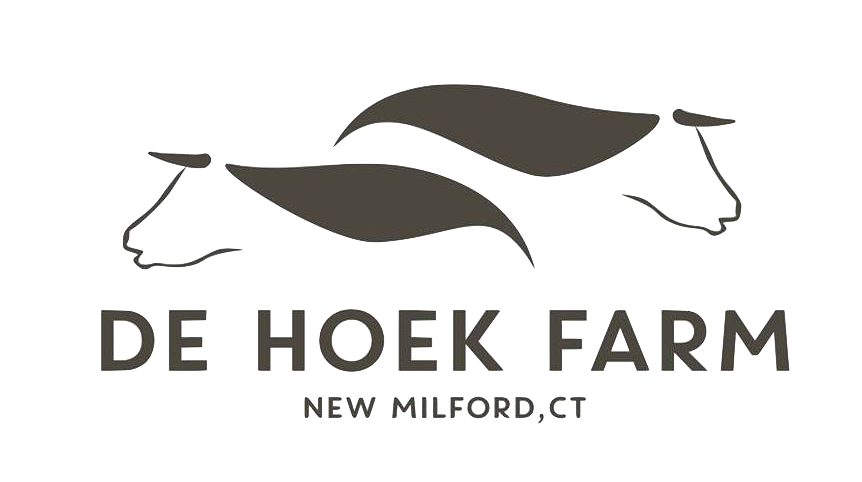
Margery Feldberg and Jeremy Levin, along with farm manager Frank Tencza, have been raising beef cattle at De Hoek Farm since 1990. What started as a hobby farm has since grown into a business endeavor, but managing their herd in an ethical fashion has always been their guiding principle.
As part of that mission, De Hoek Farm has recently completed construction of a state-of-the-art facility that is intended to make the slaughter process as humane as possible. “The whole idea is to prevent the end of life from being a deeply traumatic experience,” says Feldberg. The new facility is designed to have their cattle processed one at a time, away from the other cows, and with a view of their regular feeding area to help keep them in a comfortable state of mind. Without the need to transport their cows to an off-site facility, the cattle are also free of the anxiety caused by travel. In addition to providing a more compassionate end-of-life experience, De Hoek Farm’s low-stress environment for their Black Angus cattle results in tastier cuts of meat that have not been flushed with adrenaline or stress hormones.
De Hoek Farm: 32 Hine Rd., New Milford; 203-501-8586

Pete and Carol Sepe have been managing Sepe Farm since 1990, specializing in Connecticut-raised lamb that is pastured and grain fed. Their stock feeds primarily on the native grasses of their fields during the summer, plus second-cut hay year-round, and their winter diet is supplemented with non-GMO corn grown by Pete’s nephew at Fairview Farm in Bridgehampton, NY. They use no feed additives, preferring natural methodologies (such as pasture rotation) for control of internal parasites, and they limit use of antibiotics to livestock that have fallen ill, eschewing regular dosages.
Raising his sheep in a hospitable environment is central to Pete’s husbandry philosophy. “We raise our lambs in a stress-free environment and inspect them for signs of stress twice a day. They are free to wander and graze, and aren’t crowded. Of course, we’re always on the alert for predators, like coyotes and domestic dogs, which significantly raise the stress levels of our animals.” In addition to flavorful lamb, Sepe Farm produces a wide range of both sheepskin and wool products, including blankets and scarves.
Sepe Farm: 83 Toddy Hill Rd., Sandy Hook; 203-270-9507

Speckled Rooster Farm was started in the spring of 2011 by Matt Oricchio and Jessica van Vlamertynghe. They currently raise chickens, ducks, and rabbits, along with a variety of mixed vegetables, with a focus on leafy greens. Their animals are regularly rotated through pastured and forested paddocks, and they are never given antibiotics or hormones.
If their livestock is confined to a set area when movement becomes difficult – such as during winter, when weather conditions can limit animals’ mobility – Matt and Jessica “deep bed” both their stock's homes and outdoor space, which is never less than 50 square feet per bird. This outdoor bedding is comprised of a mixture of leaves and wood chips, encouraging the birds to scratch and root through the material, composting it in the process, and collecting and limiting any possible runoff. Speckled Rooster Farm’s animals enjoy a diet that is supplemented with home-grown plant material, and the environmental well-being of their stock is a primary concern, both for the health of their land and their customers.
Speckled Rooster Farm: 860-748-5548
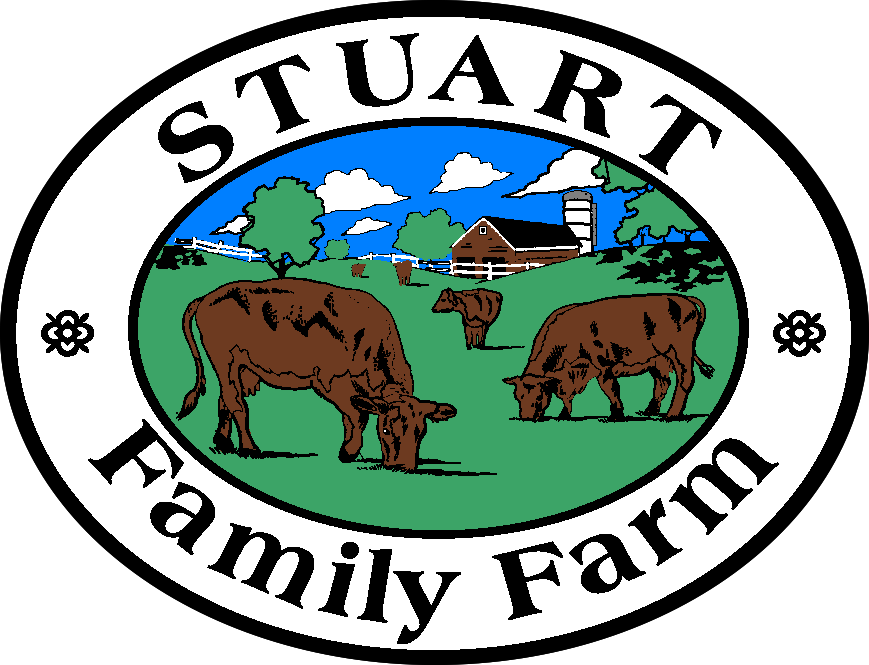
Founded as a dairy and horse farm in 1929, Stuart Family Farm has been raising cattle since the early '70s. They currently maintain a herd of Red Angus cattle and became a Certified AWA farm (Animal Welfare Approved) in 2008 after their search for a certification program that shared their core values for high-welfare and sustainable management of their herd. In 2016, they became a Certified Grass-Fed AGW farm (A Greener World), giving them the distinction of being the first farm in Connecticut to carry both AWA and AGA certifications.
“The majority of our clients express to us that their biggest concern when purchasing meat is if the animal was humanely raised and how well the animal was treated during slaughter,” says Bill Stuart. “It’s one thing to tell them ourselves, but it’s important to us to have this trusted certification to back it up.” AGW’s certification is the only grass-fed program in North America to guarantee that ruminant animals are raised outdoors and on pasture for their entire lives (with an entirely grass and forage diet), and that includes an annual review of slaughter facilities to ensure high-welfare handling, transport, and processing of animals.
Stuart Family Farm: 191 Northrup St., Bridgewater; 860-355-0172
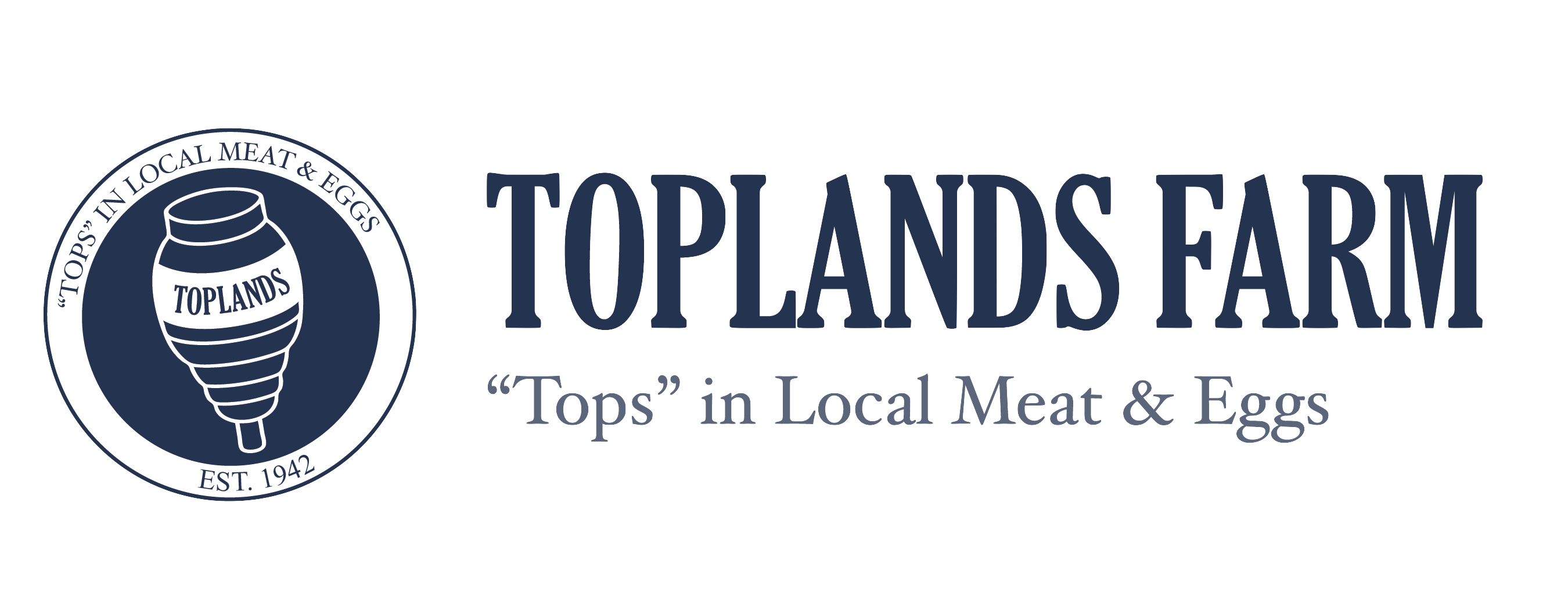
The Diebold family has owned Toplands Farm since 1942, and its long history has seen it operated as a dairy farm, a hay-production farm, and, most recently, a livestock farm, raising beef cattle, heritage-breed hogs, and chickens (both for meat and eggs). Toplands Farm enjoys significant acreage, with which they are able to grow summer grasses that are ultimately harvested for hay bales that feed their beef herd during the winter, when pasture grass is unavailable. Their feeding practices also utilize “grain assistance,” supplementing their herds’ diets with a unique formula of locally sourced grains that are fed to their cattle all year, ensuring a consistent and complete diet.
“We believe the high quality of our meat is a direct result of how we treat our animals,” says owner Dudley G. Diebold. “By raising small groups of animals, we are able to provide them with plenty of room to move around, a more complete diet, and plenty of water. Our herdsman has been raising animals here for 34 years, so we’ve had a bit of practice.”
Toplands Farm: 102 Painter Hill Rd., Roxbury; 860-354-0649
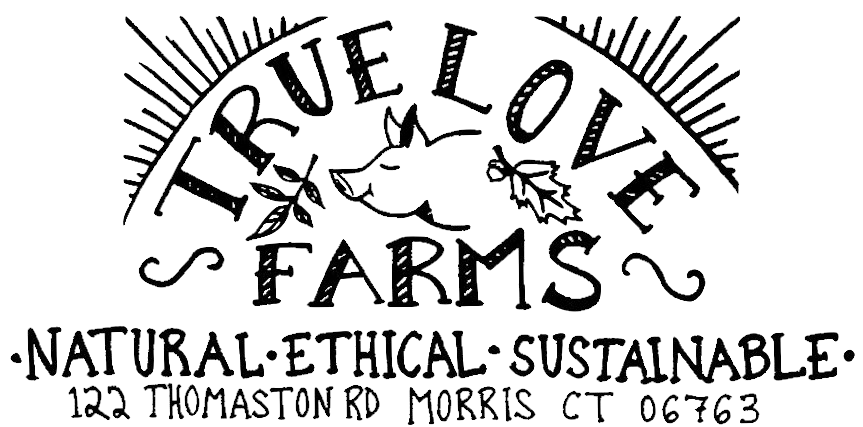
Founded in 2009 by Tom Truelove, Truelove Farms is a diversified livestock operation on 100+ acres in Morris. Although the farm includes beef cattle, turkey, meat chickens, and laying hens, it is probably best known for its heritage-breed hogs, such as Tamworths and Berkshires, all of which enjoy both pasture and forested land and are raised exclusively outdoors, free of growth hormones and sub-therapeutic antibiotics.
Providing his stock with natural and traditional living conditions is core to Truelove’s philosophy, and he feels that these conditions are a driving force behind the well-marbled and exceptionally flavorful pork that he produces. “A pig doesn’t want to live in a shed,” says Truelove. “He’d much rather wallow in the mud, dig for roots, and generally act like a pig. And because they’re allowed to lead their lives entirely outdoors and in our woodlot pastures, they get a lot of exercise and are naturally healthier. Plus, they end up with a balanced diet largely of their own choosing that is rich in high-nutrient, natural vegetation.”
Truelove Farms: 122 Thomaston Rd., Morris; 203-217-6234


